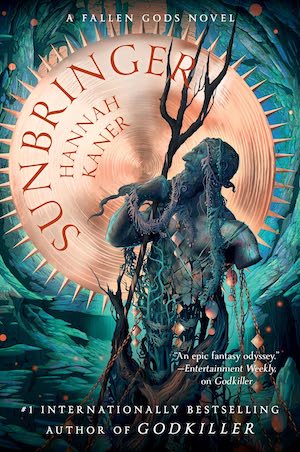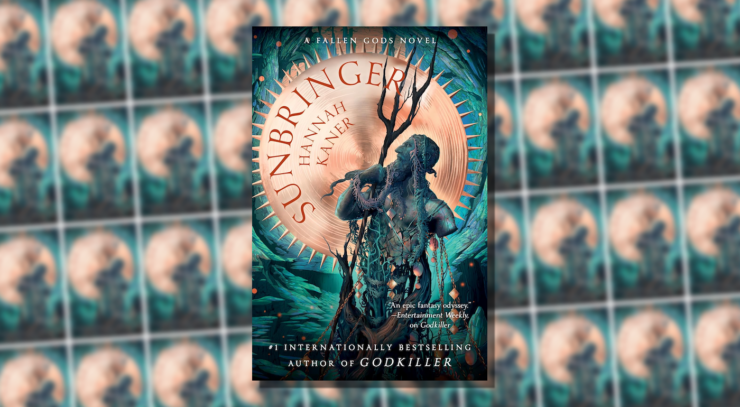Sunbringer is Hannah Kaner’s second novel, sequel to the bestselling Godkiller, and the middle book in the “Fallen Gods” trilogy. I wish I liked it as much as its predecessor. But such is the fate of middle books that have a lot to live up to, unless they’re exceptional indeed.
When last we left the main figures of Godkiller, professional godkiller Kissen had taken a dive off a cliff to kill the fire goddess Hseth, delivering her to the arms of the sea-god Osendisen; knight and former military commander Elogast had survived a curse and the attempt of his former best friend, King Arren of Middren, to sacrifice his life to the gods (most of whom Arren, hypocritically, has been trying to eradicate from Middren for the last several years) in exchange for power; Inara Craier had discovered that she has the power to compel gods, and used it; Skediceth, Inara’s little god of white lies, had broken her trust; and Arren had failed in his plans almost to the point of death.
As Sunbringer opens, Inara and Elogast believe that Kissen is dead. They’ve returned to Lesscia, to the home of Kissen’s family—one of them, Telle, an archivist at Lesscia’s famous library, and the other, Yatho, a metalworker—to bring the news. Elogast is now determined to overthrow Arren for his betrayal, hypocrisy, and general tyranny (including the burning of the aristocratic Craier family’s house and lands), while Inara wants to find information about why she has the powers that she does, why Skedi is bound to her in ways that neither of them can change, and why her mother, who she believes has been dead since the burning of the Craier lands, kept her very existence a secret. She also, much to Elogast’s dismay, wants to bring down the king: Elo doesn’t think a teenager has any business risking their life when they don’t have to.
Arren, meanwhile, has renewed his bargain with the hearth goddess Hestra to keep himself alive, and decides that his best course of action now is to turn people’s belief in him as a savior king into belief in him as a god, and make a triumphant procession through his lands in order to cast down any potential opposition. Lesscia, with its wealth and its archives’ tradition of free inquiry into all kinds of knowledge, is his goal.
Kissen survived her plunge. Osendisen deposited her on the shores of Middren’s Hseth-worshipping neighbour, Talicia, injured but alive. Hseth is dead, but not for long; the belief and sacrifices of her bloodthirsty, war-hungry followers will bring her back to life. A Talician invasion of Middren is in the works, but that bothers Kissen far less than Hseth’s coming resurrection. Her painful one-woman crusade to destroy Hseth’s shrines across Talicia is interrupted, however, by the intervention of the same gods she’s despised since her youth. This invasion means to spread the totalising worship of Hseth to the exclusion of all other gods. Kissen wants nothing to do with gods, save for killing them, but if she believes their warning, Middren—unfortunately—is going to need Arren in order not to be devastated by the forces arrayed against them. Her belated arrival back in Middren brings her face-to-face with the unexpected survival of Inara’s mother, whose own political plans are coming to fruition in Sunbringer’s climax.
The middle volume of a trilogy is a bridge between the novelty of the first volume and the climactic showdown and (hopefully) satisfying conclusion of the third. There’s a delicate balancing act between the bridge of the overarching narrative, and the middle volume’s own internal arc. When it comes to the intertwined storylines of Elogast and Inara, Kaner treads the line deftly, mixing dilemmas, setbacks, and character growth with a good eye for tension. Inara’s covert explorations of Lesscia’s archives and her interactions with Telle (whose commoner status makes her an outlier among the archivists) are particularly enjoyable.
Kissen’s part of the story, on the other hand, is set at a very literal remove from the rest of the action. While this serves to provide her with information about the wider world of gods and humans outside of Middren, her isolation and the fruitlessness of her one-woman crusade is a stark contrast to Godkiller. In Godkiller, her competent effectiveness kept the awkward, grumpy road-trip party of Kissen, Inara, Elogast and Skedi alive and moving forward towards their goal, while the slow, unwilling growth of personal bonds between the group began to wear away at Kissen’s emotional isolation. That particular set of developments was part of what made Godkiller appeal to me. Sunbringer’s choice to separate Kissen from these newly-formed connections removes a vital leaven of black humour, sarcasm, and grim pragmatism from the rest of the narrative.
Kissen’s absence from the rest of the party highlights—at least for me—another absence. Between the fire goddess Hseth and Arren, the king who would become a god, there’s little apparent difference: They both manifest totalitarian impulses. But Elogast, despite seeking out a rebellion against Arren in order to take part in overthrowing him, never articulates a real solution for who or what might replace the king in the absence of an obvious heir. (Neither do any of the Lesscian rebels, but organisation clearly isn’t one of their strong points.) It feels as though Kaner has an argument about what constitutes bad rulership (largely based around religious oppression and personal betrayal) but hasn’t put a contrasting vision of better rulership on the page. This is a curious absence, considering that Sunbringer moves into more political territory than Godkiller’s helter-skelter fantasy roadtrip.
Kaner writes action and atmosphere well, and her characters remain appealing. While I enjoyed Sunbringer rather less than Godkiller, all things considered, I’ll still be on the lookout for the concluding volume of the trilogy.
Sunbringer is published by Harper Voyager.
Read an excerpt.
Buy the Book


Sunbringer










